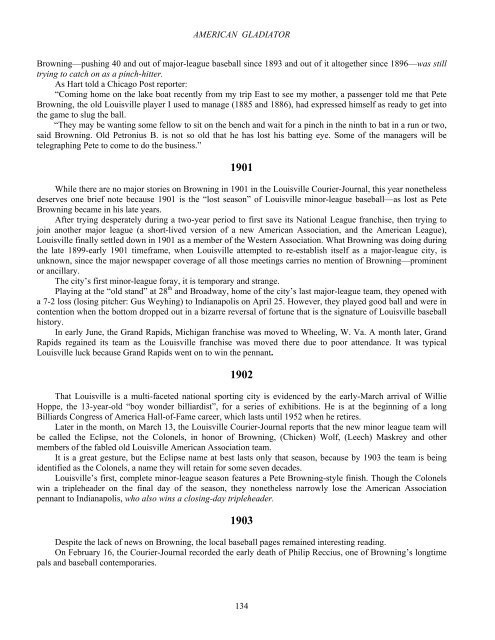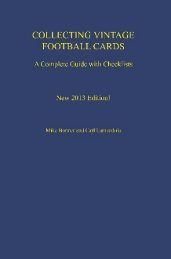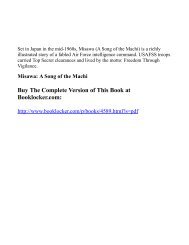AMERICAN GLADIATOR: The Life And Times Of ... - The Book Locker
AMERICAN GLADIATOR: The Life And Times Of ... - The Book Locker
AMERICAN GLADIATOR: The Life And Times Of ... - The Book Locker
Create successful ePaper yourself
Turn your PDF publications into a flip-book with our unique Google optimized e-Paper software.
<strong>AMERICAN</strong> <strong>GLADIATOR</strong><br />
Browning—pushing 40 and out of major-league baseball since 1893 and out of it altogether since 1896—was still<br />
trying to catch on as a pinch-hitter.<br />
As Hart told a Chicago Post reporter:<br />
“Coming home on the lake boat recently from my trip East to see my mother, a passenger told me that Pete<br />
Browning, the old Louisville player I used to manage (1885 and 1886), had expressed himself as ready to get into<br />
the game to slug the ball.<br />
“<strong>The</strong>y may be wanting some fellow to sit on the bench and wait for a pinch in the ninth to bat in a run or two,<br />
said Browning. Old Petronius B. is not so old that he has lost his batting eye. Some of the managers will be<br />
telegraphing Pete to come to do the business.”<br />
1901<br />
While there are no major stories on Browning in 1901 in the Louisville Courier-Journal, this year nonetheless<br />
deserves one brief note because 1901 is the “lost season” of Louisville minor-league baseball—as lost as Pete<br />
Browning became in his late years.<br />
After trying desperately during a two-year period to first save its National League franchise, then trying to<br />
join another major league (a short-lived version of a new American Association, and the American League),<br />
Louisville finally settled down in 1901 as a member of the Western Association. What Browning was doing during<br />
the late 1899-early 1901 timeframe, when Louisville attempted to re-establish itself as a major-league city, is<br />
unknown, since the major newspaper coverage of all those meetings carries no mention of Browning—prominent<br />
or ancillary.<br />
<strong>The</strong> city’s first minor-league foray, it is temporary and strange.<br />
Playing at the “old stand” at 28 th and Broadway, home of the city’s last major-league team, they opened with<br />
a 7-2 loss (losing pitcher: Gus Weyhing) to Indianapolis on April 25. However, they played good ball and were in<br />
contention when the bottom dropped out in a bizarre reversal of fortune that is the signature of Louisville baseball<br />
history.<br />
In early June, the Grand Rapids, Michigan franchise was moved to Wheeling, W. Va. A month later, Grand<br />
Rapids regained its team as the Louisville franchise was moved there due to poor attendance. It was typical<br />
Louisville luck because Grand Rapids went on to win the pennant.<br />
1902<br />
That Louisville is a multi-faceted national sporting city is evidenced by the early-March arrival of Willie<br />
Hoppe, the 13-year-old “boy wonder billiardist”, for a series of exhibitions. He is at the beginning of a long<br />
Billiards Congress of America Hall-of-Fame career, which lasts until 1952 when he retires.<br />
Later in the month, on March 13, the Louisville Courier-Journal reports that the new minor league team will<br />
be called the Eclipse, not the Colonels, in honor of Browning, (Chicken) Wolf, (Leech) Maskrey and other<br />
members of the fabled old Louisville American Association team.<br />
It is a great gesture, but the Eclipse name at best lasts only that season, because by 1903 the team is being<br />
identified as the Colonels, a name they will retain for some seven decades.<br />
Louisville’s first, complete minor-league season features a Pete Browning-style finish. Though the Colonels<br />
win a tripleheader on the final day of the season, they nonetheless narrowly lose the American Association<br />
pennant to Indianapolis, who also wins a closing-day tripleheader.<br />
1903<br />
Despite the lack of news on Browning, the local baseball pages remained interesting reading.<br />
On February 16, the Courier-Journal recorded the early death of Philip Reccius, one of Browning’s longtime<br />
pals and baseball contemporaries.<br />
134
















